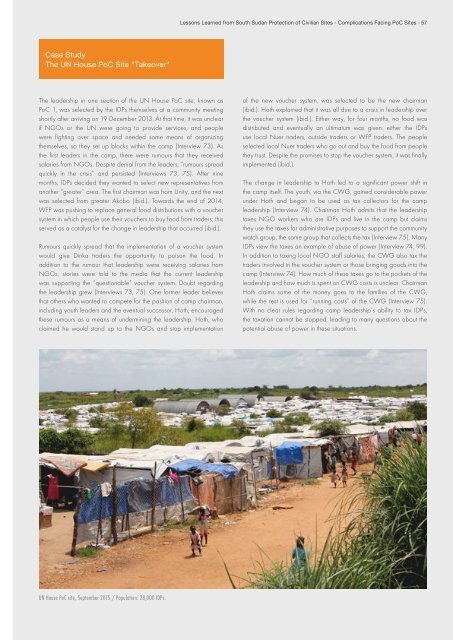Lessons Learned from South Sudan Protection of Civilian Sites 2013–2016
if_we_leave_0
if_we_leave_0
Create successful ePaper yourself
Turn your PDF publications into a flip-book with our unique Google optimized e-Paper software.
<strong>Lessons</strong> <strong>Learned</strong> <strong>from</strong> <strong>South</strong> <strong>Sudan</strong> <strong>Protection</strong> <strong>of</strong> <strong>Civilian</strong> <strong>Sites</strong> - Complications Facing PoC <strong>Sites</strong> - 57<br />
Case Study<br />
The UN House PoC Site "Takeover"<br />
The leadership in one section <strong>of</strong> the UN House PoC site, known as<br />
PoC 1, was selected by the IDPs themselves at a community meeting<br />
shortly after arriving on 19 December 2013. At that time, it was unclear<br />
if NGOs or the UN were going to provide services, and people<br />
were fighting over space and needed some means <strong>of</strong> organizing<br />
themselves, so they set up blocks within the camp (Interview 73). As<br />
the first leaders in the camp, there were rumours that they received<br />
salaries <strong>from</strong> NGOs. Despite denial <strong>from</strong> the leaders, “rumours spread<br />
quickly in the crisis” and persisted (Interviews 73, 75). After nine<br />
months, IDPs decided they wanted to select new representatives <strong>from</strong><br />
another “greater” area. The first chairman was <strong>from</strong> Unity, and the next<br />
was selected <strong>from</strong> greater Akobo (ibid.). Towards the end <strong>of</strong> 2014,<br />
WFP was pushing to replace general food distributions with a voucher<br />
system in which people use their vouchers to buy food <strong>from</strong> traders; this<br />
served as a catalyst for the change in leadership that occurred (ibid.).<br />
Rumours quickly spread that the implementation <strong>of</strong> a voucher system<br />
would give Dinka traders the opportunity to poison the food. In<br />
addition to the rumour that leadership were receiving salaries <strong>from</strong><br />
NGOs, stories were told to the media that the current leadership<br />
was supporting the “questionable” voucher system. Doubt regarding<br />
the leadership grew (Interviews 73, 75). One former leader believes<br />
that others who wanted to compete for the position <strong>of</strong> camp chairman,<br />
including youth leaders and the eventual successor, Hoth, encouraged<br />
these rumours as a means <strong>of</strong> undermining the leadership. Hoth, who<br />
claimed he would stand up to the NGOs and stop implementation<br />
<strong>of</strong> the new voucher system, was selected to be the new chairman<br />
(ibid.). Hoth explained that it was all due to a crisis in leadership over<br />
the voucher system (ibid.). Either way, for four months, no food was<br />
distributed and eventually an ultimatum was given: either the IDPs<br />
use local Nuer traders, outside traders or WFP traders. The people<br />
selected local Nuer traders who go out and buy the food <strong>from</strong> people<br />
they trust. Despite the promises to stop the voucher system, it was finally<br />
implemented (ibid.).<br />
The change in leadership to Hoth led to a significant power shift in<br />
the camp itself. The youth, via the CWG, gained considerable power<br />
under Hoth and began to be used as tax collectors for the camp<br />
leadership (Interview 74). Chairman Hoth admits that the leadership<br />
taxes NGO workers who are IDPs and live in the camp but claims<br />
they use the taxes for administrative purposes to support the community<br />
watch group, the same group that collects the tax (Interview 75). Many<br />
IDPs view the taxes an example <strong>of</strong> abuse <strong>of</strong> power (Interview 74, 99).<br />
In addition to taxing local NGO staff salaries, the CWG also tax the<br />
traders involved in the voucher system or those bringing goods into the<br />
camp (Interview 74). How much <strong>of</strong> these taxes go to the pockets <strong>of</strong> the<br />
leadership and how much is spent on CWG costs is unclear. Chairman<br />
Hoth claims some <strong>of</strong> the money goes to the families <strong>of</strong> the CWG,<br />
while the rest is used for “running costs” <strong>of</strong> the CWG (Interview 75).<br />
With no clear rules regarding camp leadership’s ability to tax IDPs,<br />
the taxation cannot be stopped, leading to many questions about the<br />
potential abuse <strong>of</strong> power in these situations.<br />
UN House PoC site, September 2015 / Population: 28,000 IDPs.


